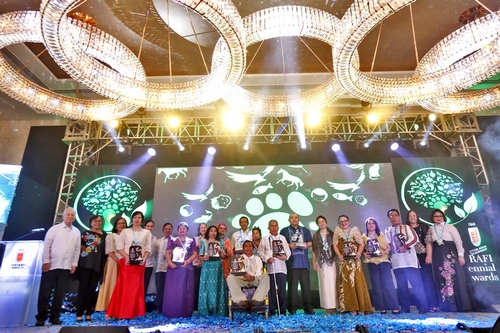
There is more hope now for the Philippine eagle and children born with a cleft palate after their respective champions won the 7th Ramon Aboitiz Foundation (RAFI) Triennial Awards last
August 31.
The Philippine Eagle Foundation (PEF) garnered the RAFI Outstanding Institution award for its movement on eagle conservation and the development of indigenous people to serve as forest guards.
On other hand, Davaoeño, Dr. Benedict Valdez — whose advocacy is to put smiles on the faces of children born with a cleft palate through free surgery — was given the RAFI Exemplary Individual recognition award.
PEF and Valdez each received a cash prize of P500, 000 and a trophy.
Dr. Jason Ibañez, PEF director for research and conservation, said that the foundation will use the cash prize to further develop programs to help indigenous communities guard the forests.
“We want to popularize the engagement of our indigenous peoples as the official forest guards of our uplands,” said Ibañez.
Ibañez noted that more communities needed to be engaged in the conservation and protection of the Philippine eagle.
“The Philippine eagles are very charismatic. A lot of people can connect to them,” Ibañez said.
Ibañez was also looking into funding more research projects for the breeding and conservation of the Philippine eagle.
The Philippine eagle, also known as the monkey-eating eagle, is endemic to the country.
Considered as the national bird of the Philippines, it is among the rarest and most powerful birds in the world.
As PEF strives to protect forests where the eagles thrive, Ibanez expressed hopes that forest guarding will become a TESDA (Technical Education and Skills Development and Authority) certified work skill.
For his part, RAFI’s individual awardee, Valdez, planned to use the half a million prize money to expand his surgical missions for patients with a cleft palate.
“The kids are waiting for our missions,” said Valdez.
Valdez began his missionary work with Maharlika Charity Foundation where he was exposed to a community in need of medical treatment.
Valdez has established three cleft referral centers at Caraga Regional Hospital, East Visayas Regional and Medical Center, and Medical Mission Group Hospital and Health Services Cooperative.
Together with Smile Train, an international cleft charity organization, Valdez and his team were able to conduct free surgeries on cleft patients who cannot afford operations.
Valdez planned to fund a research on how vast their project has reached, the demographics that still need to be targeted for the missions, and the sustainability of the mission.
“Most of the money will be for the missions; but funding research will help the mission be sustainable,” sais Valdez.
Other finalists in the RAFI Triennial Awards included the Diocese of Ipil for a livelihood program on curative health care such as acupuncture and reflexology in Ipil, Zamboanga; the Negrese Volunteers for Change Foundation, Inc. which built classrooms and libraries in indigenous communities; Process-Bohol Inc. which established the Abatan Watershed and Biodiversity Conservation creating a tourism industry for the people of Ubay, Bohol; and Tuburan for Rural Women Empowerment and Development Inc., a group of women in Dumaguete City which created a quick-response system to help
women victims of domestic violence.
Each will each receive P200,000 and a plaque.
Meanwhile, the Exemplary Individual finalists included Dr. Roel Cagabe who crossed rivers and climbed mountains of Sarangani to provide free medical care to people in remote areas; teacher Sarah Cubar who helped in building 15 schools in rural mountainous barangays of Davao del Norte; Norlan Pagal of San Remigio, Cebu who fought against dynamite fishing in his community; and Mateo Quilas, a blind man who established the Bohol Federation of Persons with Disabilities.

